
In case you missed it: last week’s article covering the US midterm elections has been updated with the latest results. Read it here.
Myth: Ulysses S. Grant was a drunk
Three things are remembered about Ulysses S. Grant: He was the Union Civil War general who played the largest role in defeating the Confederacy, he later served as a two-term president, and he was a drunk. It’s sad to say, but this characterizes the extent of the knowledge held by most laypeople — and more than a few presidential biographers, as well. The reports of Grant’s alcoholism, however, are greatly exaggerated — and largely myth.
Grant’s drinking first became the subject of gossip in the early 1850’s, when, following the Mexican-American War, then-Captain Grant was stationed on the Pacific coast. Lonely, bored, and separated from his family, he began regularly drinking. Henry Hodges, a friend, says it was during this time that “Grant got on one of his little sprees.”1 Hodges later said that Grant would go on “two or three” such sprees per year with other officers, but “was always open to reason.”2 A contractor who supplied beef to Grant’s base observed, on the other hand, that Grant imbibed “Not in enormous quantities, for he drank far less than the other officers.”3
One often overlooked piece of historical context is the ambient level of alcohol consumption of the era. In 1860, for example, the average American consumed well over eight liters of hard liquor per year — more than two and a half times the 2013 average. By all credible accounts, Grant drank less than most.
Historian Ronald C. White compiled an impressive record of correspondence from those who knew Grant or spent time in his company — virtually all attesting to Grant’s moderation. A fellow officer and friend named Palmer recalled that he “never saw Grant under the influence of liquor.” James E. Pitman, another friend, remembered, when Grant was in Michigan, “Detroit was a frontier town and all used whiskey freely… Grant drank no more than the rest of the officers.”4 During the Civil War, General David Hunter, telegraphing Secretary of War Edwin Stanton after observing Grant in the field, noted that Grant “is modest, quiet, never swears, and seldom drinks, as he only took two drinks during the three weeks I was with him.”5 Earlier, Lieutenant James Birdseye McPherson had been sent by the top brass to investigate rumors of Grant’s drinking. John Brinton, Grant’s physician, told McPherson that “the reports were unfounded, that I knew they were false,” and encouraged him to see for himself.6 McPherson never sent any reports back to Washington confirming Grant’s alleged drinking problem.
But as White points out: “Once the label ‘drunkard’ became affixed to a man in the army, it could seldom be completely erased.” Stories of Grant’s drunkenness, virtually all unsubstantiated and some even contradicted, followed him for the rest of his life. It became an all-purpose cudgel for anyone who stood to gain by slandering Grant. Fellow officers who had never met him but were envious of his rise and prominence. Superiors seeking to shift blame when they were taking heat. Journalists looking for a titillating story in an era before journalistic standards and fact-checking. The public whenever they were disappointed at a setback in the war. Confederates looking to hurt Union morale. Democrats trying to damage Grant’s presidential campaign. And “Lost Cause” Southerners angry at his use of federal troops to enforce the 14th and 15th amendments and to confront the KKK and their racist sympathizers.
It is impossible to prove a negative. We cannot know with certainty that Ulysses S. Grant was not an alcoholic. We know he drank socially. We know he had at least one period in his life when he drank heavily. We also know that many people who knew and observed him recounted that Grant, far from being a drunkard, drank very little. The rest is rumor, mostly spread by parties we know to have had a motivation in harming Grant’s reputation. These rumors spread, circulated, and calcified into legend. It is said that history is written by the victors. Some of it is written by the sore losers, too.
Myth: The word “woman” is a patriarchal derivative of “man”
History has no shortage of patriarchy, sexism, and gender-based oppression, but among the many legitimate grievances, some apocryphal ones persist. Some contemporary feminists complain that the word “man” is the default, and that “woman” is a second-class derivative. While women certainly were second-class citizens when these words came into being, the etymology tells a different story.
Back in the old days before the Norman conquest of England, the English language would have sounded a lot more like German, and they had all sorts of quirks we wouldn’t associate with the modern tongue. “Man” referred solely to people — to mankind as a whole. In Old English, you would have to talk about a “werman” if you referred to a male human — incidentally a word that survives in the form of “werewolf”, i.e. “man-wolf” — and a “wifman” if you wanted to refer to a female human. By the late 13th century, the use of “werman” shortened to “man”, while “wifman” became “wimman.” Patriarchal norms are pernicious enough, but they’re not behind every little thing.
Myth: Hitler was a Christian, or an Atheist, or an occultist
Much has been written, claimed, and speculated about Adolf Hitler. Everything from his supposed sexuality to his psychological disposition has been studied, and the available evidence pored over. Some of the most contested aspects of the Nazi dictator concern his religious beliefs. Atheists, secularists, and anti-Christians like to paint Hitler as an embodiment of Christianity run amok, from his invocations of god to his promotion of “positive Christianity.” More superficially, some point to the Wehrmacht uniform belt buckle being embossed with the phrase “Gott mit uns” (essentially meaning “God is with us”), as well as the famous 1932 photo of Hitler leaving a Protestant Church (which was originally captioned “A photographic chance event becomes a symbol” in order to appease Hitler’s early Christian critics, and was eventually changed in 1938 to read “Adolf Hitler after sightseeing at the historic Marienkirche in Wilhelmshaven” when those critics were effectively silenced).
There is an equal effort by many Christians and Christian apologists such as Jordan Peterson to paint Hitler and the Nazis as being fueled by an “atheist doctrine.” Hitler and many of his Nazi subordinates were indeed exceptionally hostile toward Christianity in private, believing it to possess a “Jewish character” and being largely responsible for Germany’s weakened status on the world stage. Nazis like Heinrich Himmler and Gottlob Berger even expressed a preference for Islam.
Then there is the even more niche belief that, like Himmler and other more esoteric-minded Nazis, Hitler was himself an occultist. While he dabbled in the esoteric early on — once even having a diviner scan the Chancellery for signs of cancer-causing “earth-rays”, as well as allegedly having a friendship with the Jewish mentalist and Nazi supporter Erik Jan Hanussen — Hitler had no time for the occult. Magicians and occultists were persecuted during his reign along with so many others.
Adolf Hitler was none of these things. It is ironic that the best-documented and most balanced source of information comes from historian Richard Weikart in his 2016 book Hitler's Religion. Weikart, a staunch creationist who previously attempted to link Hitler’s beliefs to those of Darwin — an obvious misunderstanding of both Darwinism and Darwin’s intentions — is an unlikely voice of reason on this subject. Weikart’s research of Hitler’s beliefs demonstrates that his expressions of Christianity were merely tactical — Germany was a Christian-majority country and Hitler needed to appeal to as many people as possible. But Hitler was no atheist. He believed in god — just not a Judeo-Christian one. Hitler’s god was a sort of pantheistic god of Germany — the embodiment of the nation and natural law. In his view, God was an inscrutable force that stood in for racial purity, the Aryan master race, and the survival of the fittest, with “lesser peoples” submitting to the will of nature/God. Hitler’s own messiah complex allowed him to believe that he was naturally the conduit to that god.
Everyone has a narrative to peddle, and claiming Hitler as an example is rhetorically powerful. In the final analysis, however, Hitler was an unstable madman who didn’t fit neatly into any one box.
Myth: The Nazis were socialists — or capitalists
The debate regarding the ideological nature of National Socialism was reignited back in 2010 when Glenn Beck went on his Fox News program to proclaim that the Nazis were manifestations of “socialism.” Beck even doubled down nearly a decade later, but such claims are part of a larger pattern of partisan sniping more concerned with point-scoring than with seeking the truth.
While it’s understandable to get caught on the use of the word “socialist” in the “National Socialist” label, in truth, it’s not much more than a superficial connection. There are some deeper similarities that one can draw — Hitler didn't have much love for capitalism, for example — but characterizing Hitler and the Nazis as “socialists” simply doesn’t capture the reality of the politics of Nazi Germany.
As German historian Rainer Zeitelman has pointed out, Hitler did indeed become a fan of the state-planned economy, but this was mostly animated by his hatred of private industry — namely banks, but also landowners — which he saw as inexorably tied to the Jews. This was what motivated the Nazis to seize control of many industries — both through outright theft and ideological capture — but they didn’t place control in the hands of the workers, as socialists might have done. They placed it in their control. This is why it’s also inaccurate to call the Nazis capitalists, because while they allowed industry to thrive, it was always under their ideological terms. If the Nazi economic system has any similarities to modern economic systems, it more closely resembles that of Xi’s China or what the World Economic Forum has called “stakeholder capitalism” than it does either traditional socialism or traditional capitalism.
If they weren’t socialists and they weren’t capitalists, what were they? When it comes down to it, the only real way to define Nazism ideologically is to look at the common denominator that permeates across all of Nazi thought, which is anti-Semitism. If you remove the anti-Semitism, nothing unifies the ideology, and it inevitably breaks apart.
Myth: “Incitement” is when speech results in violence
Ever since spray tan enthusiasts broke into a government building to kill an albino sidekick, complete with extensive congressional hearings, everyone’s been talking about the incitement to violence. It’s been largely an exercise in post hoc ergo propter hoc, which may sound like a medical procedure where you need to drop your pants, but means that just because thing-A happened before thing-B, the first isn’t automatically the cause of the second. An orange man gave a speech, and the people listening were violent, therefore incitement. But that’s not how incitement works. The history of this concept is both instructive and misunderstood.
The standard for incitement goes back to the 1969 ruling in Brandenburg v. Ohio. The KKK held a rally and said, well, everything you’d imagine they would. But the Supreme Court held that to convict them of incitement, it wasn’t sufficient to simply advocate for general lawlessness. Political speech in particular is the most closely guarded under the First Amendment of the US Constitution. The incitement has to be for imminent violence and the speaker needs to have the specific intention to do so.
So Ice Cube can “take the motherfuckin stand”, say “fuck tha police”, and that he’s gonna “swarm on any motherfucker in a blue uniform”, and that’s all protected political speech, even if someone in the crowd happens to get in a shootout with police after the show. (We’ll ignore the fact that he later played a police officer in Ride Along (2014), because literally no one saw it, which makes it weird that there was a sequel.) What he can’t say is “let’s go down right now to 1487 5th Street and kill Officer Taylor.” That’s clear intent to cause specific, imminent violence.
Listen, it’s not a good look if you’re a sitting president and the defense is “I’m no more brazen than the Ku Klux Klan,” but that’s actually the historical legal standard.
See also: “Everything You Know About History Is Wrong” Part I, Part II, Part IV, and Part V
…
Jamie Paul is the Founder of American Dreaming and Managing Editor of Queer Majority.
Alexander von Sternberg is a US-based writer and editor, and the host of the History Impossible podcast.
Johan Pregmo is a Sweden-based writer and contributor to American Dreaming.
Timothy Wood is a US-based writer and editor, and contributor to American Dreaming.
Subscribe now and never miss a new post. You can also support the work on Patreon. Please consider sharing this on your social networks. You can reach me at @AmericnDreaming on Twitter, or at AmericanDreaming08@Gmail.com.
American Ulysses: A Life of Ulysses S. Grant by Ronald C. White, Random House, 2016, (e-book) chapter 8
Ibid. End notes
Ibid. Chapter 8
Ibid. Chapter 7
Ibid. Chapter 18
Ibid. Chapter 13











Your last 'myth' is really bare bones (and also not really historical). You are absolutely right in that the legal standard is incitement to "imminent, lawless action"
But, when we're asking if President Trumps words rise to that standard what we have is a very fact based (as opposed to the general principle of law based) discussion as to whether his words meet the elements of the crime. And people can have differing opinions on whether those facts rise to the standard. As someone with absolutely no love of Trump I don't think his words are sufficient to prove beyond a reasonable doubt he intended them to cause lawless action. If he did intend it however it would probably count as an imminent, Trump knew and referenced that the crowd was marching to the Capitol right after his speech.
-Hitler was a THULEAN. This is a religion. It was this religion that allowed him to secure loans and assurances from outside Weimar.
-Nazis, like the Italians, used KEYNESIAN ECONOMICS extensively in the CENTRALIZATION of their SOCIALIZED economy. They seized the means of production just the same as every other socialist state, but didn't bother with the pretext of "worker owned" anything. I wonder who else has used KEYNESIAN ECONOMICS for the CENTRALIZATION of their economy.
-Nazis were unified by their NATION, not by their NATION'S HATRED. This is difficult for you to comprehend, because you hate your nation and don't believe its history was worth fighting for. Nazis came to power by pointing out Weimar that was infiltrated and subverted by individuals (largely Jewish and Freemasonic individuals) who had no stake in her welfare and success, and conspired to oppress and punish them. It was through leveraging love of a nation and a clear, coherent, comprehensible narrative against subversive groups operating within that nation which gave rise to Hitler.
Statements like "the nazis had nothing but anti-semitism uniting them" are as stupid as they are ahistorical. If you think the average nazi voter cared more about punishing Jews than restoring the glory of the Fatherland, then you are painfully oblivious to the conditions of the Weimar Republic, and how neatly our current conditions are coming to emulate them. I hope you wake up before history repeats itself.
EULOGIA